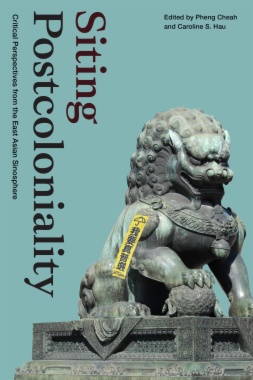The contributors to Siting Postcoloniality reevaluate the notion of the postcolonial by focusing on the Sinosphere—the region of East and Southeast Asia that has been significantly shaped by relations with China throughout history. Pointing out that the history of imperialism in China and Southeast Asia is longer and more complex than Euro-American imperialism, the contributors complicate the traditional postcolonial binaries of center-periphery, colonizer-colonized, and developed-developing. Among other topics, they examine socialist China’s attempts to break with Soviet cultural hegemony; the postcoloniality of Taiwan as it negotiates the legacy of Japanese colonial rule; Southeast Asian and South Asian diasporic experiences of colonialism; and Hong Kong’s complex colonial experiences under the British, the Japanese, and mainland China. The contributors show how postcolonial theory’s central concepts cannot adequately explain colonialism in the Sinosphere. Challenging fundamental axioms of postcolonial studies, this volume forcefully suggests that postcolonial theory needs to be rethought.
Contributors. Pheng Cheah, Dai Jinhua, Caroline S. Hau, Elaine Yee Lin Ho, Wendy Larson, Liao Ping-hui, Lin Pei-yin, Lo Kwai-Cheung, Lui Tai-lok, Pang Laikwan, Lisa Rofel, David Der-wei Wang, Erebus Wong, Robert J. C. Young
- Cover
- Contents
- Series Editor’s Preface / Carlos Rojas
- Acknowledgments
- Introduction: Situations and Limits of Postcolonial Theory / Pheng Cheah
- Part I. Framing the Postcolonial
- 1. Mythmaking: The Nomos of Postcoloniality / Robert J. C. Young
- 2. On Twenty-First-Century Postcolonialism / Dai Jinhua, translated by Erebus Wong and Lisa Rofel
- Part II. Chinese Socialist Postcoloniality
- 3. Who Owns Social Justice? Permanent Revolution, the Chinese Gorky, and the Postcolonial / Wendy Larson
- 4. De-Sovietization and Internationalism: The People’s Republic of China’s Alternative Modernity Project / Pang Laikwan
- Part III. Hong Kong Postcoloniality among the British, Japanese, and Chinese Empires
- 5. From Manchukuo to Hong Kong: Postcolonizing Asian Colonial Experiences / Lo Kwai-Cheung
- 6. Decolonization? What Decolonization? Hong Kong’s Political Transition / Lui Tai-lok
- 7. Locating Anglophone Writing in Sinophone Hong Kong / Elaine Yee Lin Ho
- Part IV. Taiwan Postcoloniality between Japaneseand Chinese Colonialisms
- 8. The Slippage between Empires: The Production of the Colonized Subject in Taiwan / Lin Pei-yin
- 9. Questions of Postcolonial Agency: Two Film Examples from Taiwan / Liao Ping-hui
- Part V. Diasporas in East and Southeast Asian Postcoloniality
- 10. Sinophone Geopoetics: From Postcolonialism to Postloyalism / David Der-wei Wang
- 11. Multiple Colonialisms and Their Philippine Legacies / Caroline S. Hau
- 12. Diasporic Worldliness in Postcolonial Globalization / Pheng Cheah
- References
- Contributors
- Index
- A
- B
- C
- D
- E
- F
- G
- H
- I
- J
- K
- L
- M
- N
- O
- P
- Q
- R
- S
- T
- U
- V
- W
- X
- Y
- Z

